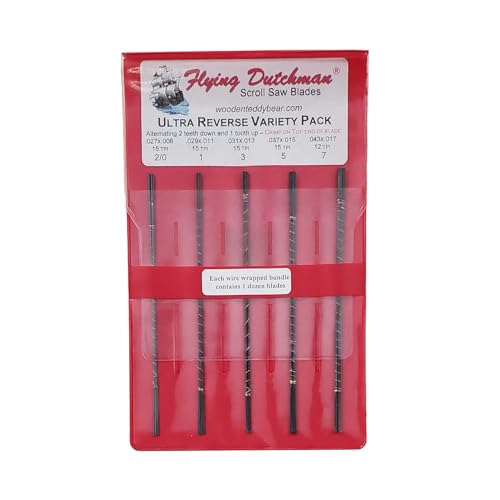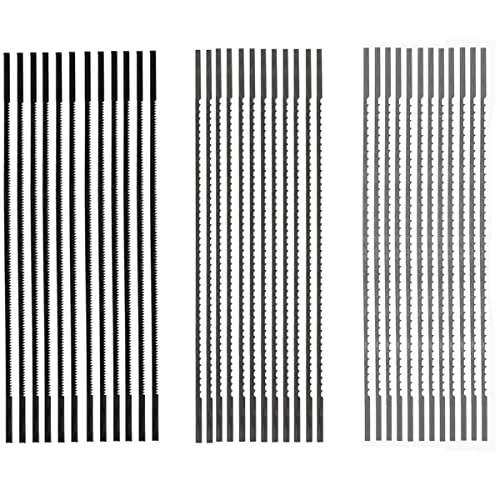When you’re working with intricate wooden designs, your scroll saw blade choice can make or break your project. You’ll find dozens of options on the market, from pin-end to plain-end blades, each promising superior performance. Whether you’re crafting detailed jewelry boxes or cutting complex patterns, selecting the right blade will determine your precision and efficiency. Let’s explore six top-rated scroll saw blades that’ll transform your woodworking experience.
JTEX Scroll Saw Blade 5-Inch Pin End Assortment (48 Pack)
If you’re looking for versatile scroll saw blades that work with multiple popular brands, JTEX’s 48-piece pin end assortment delivers exceptional value. These 5-inch pin end blades fit seamlessly with Wen 3921, Delta, Ryobi, Dremel, Craftsman, and Penn State scroll saws.
You’ll get an extensive mix of tooth counts, with 12 blades each in 10TPI, 15TPI, 18TPI, and 24TPI configurations. The blades handle wood, plastic, copper, and soft metals effectively, though you’ll need to sand rough edges on plywood projects. While some customers report receiving incorrect pinless versions, most users praise these blades for maintaining sharpness across both fine and coarse cutting applications.
Best For: Hobbyist woodworkers and DIY enthusiasts who need versatile scroll saw blades compatible with multiple popular saw brands and various materials.
Pros:
- Wide variety of tooth counts (10-24 TPI) suitable for different cutting needs
- Compatible with multiple popular scroll saw brands
- Maintains sharpness well during both fine and coarse cutting tasks
Cons:
- Leaves rough edges that require additional sanding
- Some customers received incorrect pinless versions
- Mixed customer service response to reported issues
Proxxon 28745 Pin End Scroll Saw Blades, Fine Toothed
For woodworkers seeking precise, intricate cuts, Proxxon’s 28745 Pin End Scroll Saw Blades offer exceptional control with their fine-toothed design. With 25 teeth per inch, these high-speed steel blades excel at creating detailed cuts in wood, plastics, and non-ferrous metals.
You’ll appreciate the 5-inch blades’ versatility when working on intricate projects. Each pack includes 12 blades, and they’ve earned a strong 4.6-star rating from over 700 users. While they’re more expensive than generic options, customers report they deliver superior cutting performance with less splintering and cleaner finishes. The pin-end design guarantees secure blade mounting for safer, more accurate cuts.
Best For: Woodworking enthusiasts and crafters who need precise, detailed cuts in wood, plastics, and non-ferrous metals, especially those working on intricate scroll saw projects requiring fine detail.
Pros:
- High-quality high-speed steel construction ensures durability and consistent cutting performance
- Fine-toothed design (25 TPI) enables smooth, precise cuts with minimal splintering
- Secure pin-end mounting system provides better stability and safer operation
Cons:
- More expensive than generic scroll saw blades
- Limited to tools compatible with pin-end blade design
- Some users report issues with blade longevity during intensive use
Olson Saw FR49400 Skip Tooth Scroll Saw Blade Assortment,36
The Olson Saw FR49400 Skip Tooth Scroll Saw Blade Assortment stands out as an excellent choice for both beginners and experienced craftsmen who work with diverse materials. This 36-piece set includes high carbon steel blades that’ll help you cut through wood, plastic, bone, and non-ferrous metals with precision.
You’ll appreciate the skip tooth design that guarantees fast cuts and smooth finishes while effectively clearing chips. At 5 inches long with plain ends, these blades excel at intricate shapes and tight-radius turns in materials up to 2″ thick. With a stellar 4.7-star rating from over 1,300 users, you can trust their proven performance and durability.
Best For: Hobbyists and craftspeople who need versatile blades for detailed scroll saw work across multiple materials including wood, plastic, bone, and non-ferrous metals.
Pros:
- High-quality carbon steel construction ensures durability and consistent cutting performance
- Skip tooth design provides smooth cuts and effective chip clearance
- Versatile blade set works well on various materials up to 2″ thick
Cons:
- May not be suitable for large-scale industrial projects
- Limited to 5-inch length which may not fit all scroll saw models
- Plain end style might not be compatible with all scroll saw types
Flying Dutchman Scroll Saw Blade Variety Pack
Serious woodworkers seeking professional-grade scroll saw blades will find exceptional value in Flying Dutchman’s Ultra Reverse Variety Pack. You’ll get five dozen German-made pinless blades in sizes #2/0, #1, #3, #5, and #7, each measuring 5 inches long.
These hardened steel blades feature a unique design with every third tooth reversed, preventing splintering on your project’s underside. The milled construction delivers sharper cutting edges for aggressive yet smooth cuts. You’ll notice superior durability compared to cheaper alternatives, making them a cost-effective choice for long-term use. The variety pack’s versatile selection handles multiple scroll saw applications while maintaining clean, controlled cuts.
Best For: Experienced woodworkers and scroll saw enthusiasts who want professional-quality blades for precise, splinter-free cuts across various project types.
Pros:
- Superior German steel construction provides exceptional durability and longevity
- Unique reverse-tooth design prevents splintering on project undersides
- Variety pack offers excellent value with multiple blade sizes for different applications
Cons:
- Higher initial cost compared to basic scroll saw blades
- Packaging could be improved according to customer feedback
- Documentation and tax invoice issues reported by some customers
FOXBC 5 Inch Plain End Scroll Saw Blade Set, 36 Pack (28TPI, 12 TPI, 10TPI)
Professional craftsmen seeking reliable scroll saw blades will find value in FOXBC’s 5-inch plain end set, which includes 36 blades across three TPI configurations. You’ll get 12 blades each of 28 TPI, 12 TPI, and 10 TPI, suitable for cutting woods, plastics, and non-ferrous metals.
While these precision-sharpened blades excel at intricate cuts and joints, you’ll find mixed performance reviews. Some users report successful cuts through dense materials, while others experience frequent breaking, especially with hardwood. You may need to treat the blades for rust prevention. If durability is your priority, you might want to take into account premium alternatives from specialty retailers.
Best For: Entry-level craftsmen and hobbyists who need a variety of scroll saw blades for light to medium-duty work and are willing to trade some durability for quantity and value.
Pros:
- Comprehensive set with three different TPI options for varied cutting needs
- Precision-sharpened blades capable of intricate cuts and joints
- Good value with 36 blades included in the package
Cons:
- Inconsistent durability with some blades breaking during hardwood cutting
- Potential rust issues requiring preventative treatment
- Mixed quality control leading to variable performance between blades
FOXBC 5-Inch Scroll Saw Blade Pin End Replacement (48 Pack)
Versatile woodworkers seeking an all-encompassing blade set will find excellent value in FOXBC’s 5-inch pin end scroll saw blades. This 48-pack features 12 blades each in 10, 15, 18, and 24 TPI, crafted from SK5 Japanese carbon steel for enhanced durability and corrosion resistance.
You’ll appreciate their compatibility with major brands like WEN, Dremel, Craftsman, and Ryobi. While they perform well on softer woods and materials, you might experience occasional breakage when cutting hardwoods. Their sharp edges and easy installation make them ideal for general woodworking projects, though you’ll want to be cautious with tougher materials.
Best For: Hobbyist woodworkers and DIY enthusiasts seeking an economical variety pack of scroll saw blades for light to medium projects involving soft woods and materials.
Pros:
- Compatible with numerous popular scroll saw brands
- Excellent value with 48 blades in varying TPI options
- Sharp edges and easy installation process
Cons:
- Prone to breakage when cutting hardwoods
- Variable durability depending on material type
- May not be suitable for heavy-duty professional use
Factors to Consider When Choosing Scroll Saw Blades for Wood
When you’re selecting scroll saw blades for wood projects, you’ll need to match the blade type and TPI (teeth per inch) to your specific cutting needs. The material you’re cutting and the quality of the blade itself will greatly impact your results, with higher-quality blade materials offering better performance and longer life. You’ll also need to choose between pin-end and plain-end blades based on your saw’s compatibility and the type of detailed work you plan to do.
Blade Type and Design
Selecting the right scroll saw blade type and design is essential for achieving precise, clean cuts in your woodworking projects. You’ll find three main blade types: plain end, pin end, and skip tooth, each serving different cutting needs.
For intricate, detailed work, you’ll want to use fine-toothed blades with higher TPI counts. If you’re working with thicker wood, skip tooth blades offer better chip clearance and more efficient cutting. Consider blades with reverse teeth when you need smooth finishes on both sides of your material to prevent splintering.
The blade’s width matters too – narrower blades excel at tight curves and delicate patterns. Pay attention to the blade’s material composition, as high-speed steel and carbon steel options differ in their durability and ability to maintain sharpness during extended use.
Teeth Per Inch (TPI)
The number of teeth per inch (TPI) plays an essential role in determining your scroll saw blade’s performance and cut quality. When you’re working with thicker or softer wood, you’ll want to select blades with lower TPI counts (10-12) as they’ll cut faster, though they’ll leave a rougher finish. For delicate projects requiring precise details and smooth edges, opt for higher TPI blades (18-25).
Your material’s thickness should guide your TPI choice. If you’re tackling intricate patterns or tight curves, you’ll achieve better results with high TPI blades that reduce splintering and provide cleaner cuts. However, if you’re making straight cuts through sturdy wood, lower TPI blades will help you complete your project more efficiently. Choosing the wrong TPI can lead to broken blades or poor cutting results.
Material Being Cut
Different types of wood require specific blade characteristics to achieve ideal cutting results. When you’re working with softwoods, you’ll want to choose blades with fewer teeth per inch, as they’ll help you make faster cuts through the material. However, if you’re cutting hardwoods, opt for blades with higher TPI to guarantee smoother finishes and cleaner edges.
The thickness of your wood is another vital factor in blade selection. You’ll need more durable blades for thicker pieces to prevent breakage during cutting. While you might be tempted to use the same blade for all your projects, matching the right blade to your specific wood type will not only improve your cutting efficiency but also extend your blade’s life. This approach saves you time and money in the long run.
Blade Material Quality
Beyond wood type considerations, blade material quality stands as a fundamental factor in scroll saw performance. You’ll find that high-speed steel blades offer superior wear resistance and maintain their edge longer, making them ideal for extensive projects. While carbon steel blades provide excellent flexibility for general woodworking, they’re not always the best choice for precision cuts.
You should consider that high-carbon steel blades deliver sharper cutting edges but require more frequent replacements. If you’re working in humid conditions or storing your tools for extended periods, opt for corrosion-resistant blades to guarantee longevity. For detailed work, you’ll want precision-engineered blades, as their consistent manufacturing quality delivers cleaner, more accurate cuts. The investment in higher-grade materials typically pays off through improved performance and reduced blade replacements.
Pin Vs Plain End
Selecting between pin end and plain end scroll saw blades presents an essential decision for woodworkers. Pin end blades offer tool-free installation with their quick-change mechanism, making them perfect for simple projects and saws designed to accommodate them. However, plain end blades provide greater versatility and stability, working with most scroll saw models.
If you’re focused on advanced cutting techniques and precision work, you’ll find plain end blades more suitable. They allow for intricate details and smoother cuts, particularly when using fine-toothed configurations. Pin end blades, while convenient, may limit your cutting options. Consider your saw’s compatibility and project requirements when choosing. For instance, if you need skip-tooth blades for efficient material removal, check which end type best matches your saw’s specifications and your woodworking goals.
Project Complexity Requirements
The complexity of your woodworking project directly shapes your blade selection. For intricate designs and delicate curves, you’ll want to use high TPI blades around 24 teeth per inch, which deliver smoother cuts and minimize splintering. However, if you’re working with thicker materials or need faster cutting speeds, choose lower TPI blades around 10 teeth per inch to guarantee efficient chip removal and reduce heat buildup.
When you’re tackling projects with tight radius turns or complex patterns, select blades specifically engineered for detailed work to maintain control and precision. Consider your desired finish quality too – finer-toothed blades produce cleaner cuts that require less sanding afterward. For hardwood projects, make certain to pick durable blades that’ll maintain their sharpness throughout extended cutting sessions.
Blade Width Selection
When choosing scroll saw blades for wood projects, blade width plays a crucial role in determining your cutting capabilities and outcomes. You’ll find blade widths ranging from 1/16 inch to 1/4 inch, each suited for specific applications.
If you’re working on intricate designs with tight curves and detailed patterns, you’ll want to select narrower blades under 1/8 inch. These thinner blades offer superior maneuverability for delicate work. However, when you’re cutting thicker materials or need straighter cuts, opt for wider blades that provide more stability and faster cutting speeds.
Consider your material’s thickness and type carefully before selecting a blade width. Using the wrong size can lead to broken blades or poor-quality cuts. Remember that wider blades excel at hardwoods and laminates, while narrower ones are perfect for detailed scrollwork.
Machine Compatibility Check
Making certain your scroll saw blades match your machine’s specifications is critical for both safety and performance. First, you’ll need to determine whether your saw accepts pin end or plain end blades, as using the wrong type won’t work in your machine.
Check your saw’s required blade length, which is often 5 inches for standard models. You don’t want to install a blade that’s too long or too short, as this can lead to poor cuts or potential accidents. Pay attention to the maximum blade thickness your saw can handle, and match the TPI to your project needs. Also, consider the blade material and design features when selecting blades for specific materials like hardwood or plastic. These factors will make certain you’re using the right blade for your machine and project.








